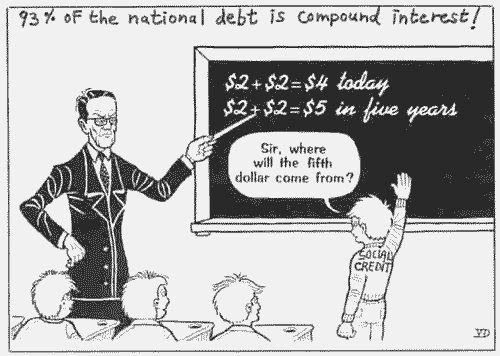|
Chapter 32 - Should Money Claim Interest? (An
article of Louis Even, first published in the March 15, 1945 issue of
the Vers Demain Journal.) We
believe that there is not one thing in the world which lends itself to
so much abuse as money. This is not because money in itself is a bad
thing. On the contrary, money is
probably one of man's most brilliant inventions, making trade flexible,
favouring the sale of goods as required by needs, and making life in
society easier.
But,
to place money on an altar is idolatry. To make of money a living thing,
which gives birth to other money, is unnatural. Money
does not breed money, as the Greek philosopher Aristotle said. Yet, how
many contracts are entered into — contracts between individuals,
contracts between governments and creditors, which stipulate that money
must breed money, or else properties or freedoms are forfeited? Little
by little, everybody has sided behind the theory, and especially behind
the practice, that money must produce interest. And in spite of all the
Christian teaching to the contrary, the practice has made so much
headway that, so as not to lose in the furious competition around the
fertility of money, everybody must behave today as if it was natural for
money to breed money. The Church has not abrogated her old laws, but it
has become impossible for her to insist on their application. The
methods used to finance World War II, in which we were Churchill,
Roosevelt, and Stalin's acolytes to defend Christianity, solemnly
consecrated the rule that money, even money thrown into the sea or into
the burning flames of cities, must bear interest. We refer here to the
Victory Bonds, which finance destruction, which do not produce anything,
and which must bear interest just the same. Interest and dividends So
that our readers do not pass out thinking about their savings put into
industry or loan institutions, let us hastily make a few distinctions. If
money cannot increase by itself, there are things that money buys which
logically produce developments. Thus I
set aside $5,000 to purchase a farm, or animals, seeds, trees,
machinery. With intelligent work, I will make these things produce
others. The
$5,000 was an investment. By itself it has not produced anything; but
thanks to this $5,000, I have been able to get things that have
produced. Let
us suppose that I did not have this $5,000. But my neighbour had it, and
he did not need it for a couple of weeks. He loaned it to me. I think it
would be proper for me to show my gratitude by letting him have a small
portion of the products which I get, thanks to the productive capital
which I have thus been able to obtain. It
is my work which has made his capital profitable. But this capital
itself represents accumulated work. We are then two, whose activities
— gone by for him, present for me — cause some production to appear.
The fact that he waited to draw on the country's production with the
money he received as a reward for his work, allowed me to get the means
of production that I would not have had without it. We
are therefore able to divide the fruits of this collaboration between
us. There remains to determine, by agreement and equity, the part of
production that is owed to the capital. What
my lender will get in this case is, strictly speaking, a dividend. (We
divided the fruits of production.) The
dividend is perfectly justifiable, when production is fruitful. This
is not exactly the idea that one generally attaches to the word
“interest”. Interest is a claim made by money, in function of time
only, and independently of the results of the loan.
We
cannot see anything that justifies this claim, save that it is
customary. It does not rest upon any principle. There
is therefore justification for a dividend, because it is subordinated to
production growth. There is no justification for interest in itself,
because it is dissociated from realities; it is based on the erroneous
idea of a natural and periodical generation of money. Indirect investments In
practice, he who brings his money to the bank indirectly puts it into a
productive industry. The bankers are professional lenders, and the
depositor passes his money to them, because they are capable of making
it thrive better than he can, without having to look after it himself. The
small interest that the banker enters to the depositor's credit from
time to time, even at fixed rates, is in fact a dividend, a share from
the income that the banker, with the help of the borrowers, has obtained
from productive activities. Anonymous investments In
passing, let us say a word on the morality of investments. Many
people are not preoccupied in the least with the usefulness nor the
noxiousness of activities that their money will finance. As long as it
yields profits, they say, it is good. And the more profit it yields, the
better the investment is. A
pagan would not reason differently. If
a house-owner does not have the right to rent his house to serve as a
brothel, even though it would be very profitable, the owner of savings
does not have any more the right to put them into enterprises which ruin
souls, even if the enterprises fill pockets. Moreover,
it would be much preferable for the backer and the entrepreneur to be
less dissociated. The smaller industry of old was much more sound: The
financier and the entrepreneur were the same person. The corner
storekeeper is still in the same situation. The chain stores are not.
The co-operative, the association of people, keeps the relation between
the use of money and its owner, and has the advantage of making possible
enterprises which exceed the resources of one sole individual. In
the case of companies that issue shares on the market, the money comes
without its owner. This is a generalized evil. We have already explained
(in the October 1942 issue of the Vers
Demain Journal) how this problem could gradually be solved by
introducing corporate ownership of big industry. The members of industry
would gradually become owners of it, without harm to acquired interests.
But this would first require a Social Credit system. The growth of money Let
us go back to the beginning question: Should money claim interest? We
are therefore inclined to answer: Money can claim dividends when there
are fruits. Otherwise, no. If
contracts are drafted differently, if the farmer must pay back interest,
even though he did not receive any crop that year; if the farmers of
Western Canada must honour liabilities at 7%, when the Financiers who
lead the world cause prices to fall to one-third of what they were, this
does not change anything about the principle. It simply proves that one
has substituted reality for trickery. But
if money can claim dividends, when there is a production increase, this
production increase must automatically create an increase in money.
Otherwise, the dividend, while being perfectly justifiable, becomes
impossible to provide without giving a blow to the public from which it
was extracted. I
was saying a few lines above: If, thanks to the $5,000 which allowed me
to buy ploughing implements, I have increased my production, the lender
is entitled to a share of these good results. This is very easy to do if
I let him have a share of these increased products. But if it is money
that I must give to him, it is quite another story. If there is no
increase of money in the public, my increased production creates a
problem: more offered goods, but no increase of money in front of them.
I may be successful at displacing another seller, but he will be the
victim. One
will tell me that the $5,000 must have contributed to increasing money
in circulation. Yes, but I must pump back the $5,000, plus what I call
the dividend, what others call interest. Then
the problem is not settled. And in our economic system, it cannot be.
For money to increase, it is necessary that the bank—the only place
where the increase is created—lends some somewhere. But in lending it,
the bank exacts a repayment that is also increased. The problem
snowballs. The
Social Credit system would settle that problem, as well as settle many
other problems. The
dividend is a legitimate, normal, logical thing. But the present system
does not allow one to pay it without making it hurt somewhere. It
is undoubtedly the reason that makes so many decry dividends. Note that
the Communists and the Socialists always clamour against dividends, but
never against interest. It has not entered their minds yet to denounce
the source of evil: the creation of money by private institutions which
lend it from its very emission at interest. Two horrors Now,
this is an indescribable horror. An organized society, men's work, the
progress of science, bring forth wealth: but it is the bankers who
create the money based on this wealth, and they appropriate this money,
since they do not allow it to be used without lending it at interest. The
other horror is that of governments which resort to loans for public
use. Where is the sovereignty of a government which has not the right to
create funds, when the increased production necessitates an increase in
money? And
to this horror, our Federal Government, through its Victory Bonds, adds
immorality, by promising interest on capital which does not produce as
much as a blade of grass. Put
one billion dollars into cannons, bombs, and anything you would want of
this kind, and run after the fruits of this production to distribute
them in dividends to the lenders. These fruits are shattered brains,
scattered bowels, mutilated bodies, ruins, tears, blood, hatred, that
one ought to logically offer as interest to those who subscribe to the
Victory Bonds, since these fruits are the products of their investments. As
for the repayment of the capital, a government which itself does not
acknowledge that it has the right to create money, ought to be honest
enough to say to the buyers of bonds: provide your money; it will come
back to you as wages or salaries for your work in the war industries;
then I will take it out of your pockets, little by little, to put it
back into your hands as repayments for your loans.
|

 Here
is $1,000.
Here
is $1,000.